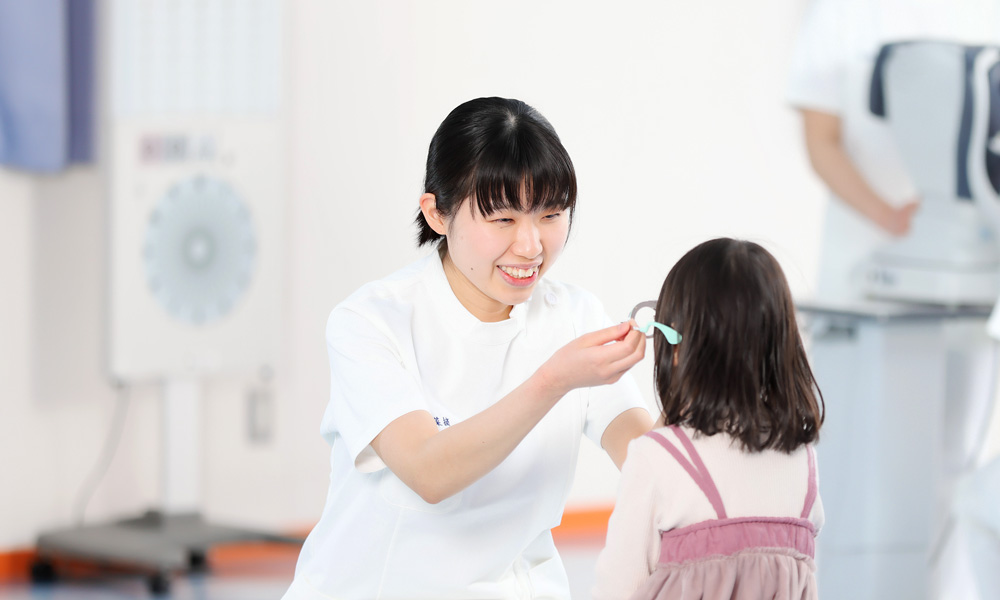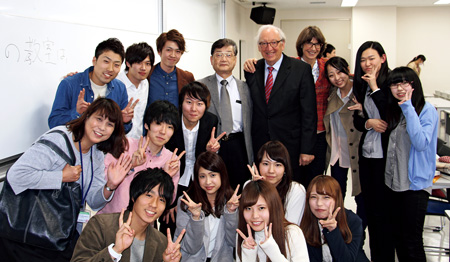
Objectives
The Department of Orthoptics and Visual Sciences aims to nurture health professionals with the national license for certified orthoptists, and the public qualification for the accompanying supporters for the visually impaired. Our department trains orthoptists who are able to manage a wide range of issues including the increasing number of people with visual impairments
Characteristics of the Curriculum
In order to develop reliable skills in ophthalmologic examination techniques, we offer practical and extensive on-campus trainings conducted in small groups and step-by-step progressive off-campus internship programs in a variety of clinical institutions. To foster sophisticated research skills, students are required to write a graduation thesis on themes that meet the needs of society. Supplementary courses to secure the success in the national examination for certified orthoptists are also provided.
Qualifications and Careers
Students are able to acquire the public qualification for the accompanying supporters for the visually impaired, and all graduates are eligible to take the national examination for certified orthoptists.
International Activities
 Special lectures were given on the state-of-the-art artificial retina by Prof. Eberhart Zrenner from the Institute for Ophthalmic Research, University of Tübingen, Germany, and also on the optometry education in New Zealand by Mr. Andrew Kim, an undergraduate from the University of Auckland, New Zealand. Furthermore, we are conducting a joint research project with the University of Tübingen, and are currently planning study tours for our students to a variety of universities abroad.
Special lectures were given on the state-of-the-art artificial retina by Prof. Eberhart Zrenner from the Institute for Ophthalmic Research, University of Tübingen, Germany, and also on the optometry education in New Zealand by Mr. Andrew Kim, an undergraduate from the University of Auckland, New Zealand. Furthermore, we are conducting a joint research project with the University of Tübingen, and are currently planning study tours for our students to a variety of universities abroad.
Diploma, Curriculum and Admission Policies (Department of Orthoptics and Visual Sciences)
| STEPS Abilities and attitudes of qualified QOL supporters |
Diploma Policy NUHW grants a bachelor's degree to the students who have acquired the following abilities and attributes. |
Curriculum Policy NUHW implements the curriculum as follows in order to help students develop into competent QOL supporters. |
Admission Policy NUHW seeks students who have the following abilities and attributes. |
|
|---|---|---|---|---|
| S | Science & Art Ability to utilize scientific knowledge and skills in academic discipline |
Abilities to apply advanced expertise and skills in orthoptics and visual sciences in clinical practices | Rubrics are ulitized, and five small-group on-campus trainings are provieded. Seminars are provided in the third and fourth years to foster applicational abilities.To be supported according to their individual characteristics in collaboration with the Learning Support Center. The learning outcomes are evaluated by the pass rate of the national examination. | Basic academic skills in subjects in the entrance examination such as highschool-graduate level English, Japanese, and mathemetics |
| T | Teamwork & Leadership Ability to work together as a team and to show leadership qualities |
Abilities to demonstrate leadership as specialists for solving clients' problems in interprofessional collaborative practices | Clinical trainings in off-campas medical facilities are provided. Rubrics are utilized and training levels are progressed in a step-by-step manner such as "observation" in the second year, "examination and training" in the third year, and "comprehension" in the fourth year. In the third year, trainings in nursery schools and welfare facilities for the elderly are provided. The learning outcomes are evaluated by the achievments in off-campus trainings. | Abilities to listen to others carefuly and to express their own thoughts well |
| E | Empowerment Ability to support clients by giving them powers to promote QOL |
Attitude to be responsible for performing professional duties to promote clients' QOL with respect and support for their diverse backgrounds | A course to acquire the qualification of accompanying supporter for the visually impaired is provided. In the third year, a training in schools for the blind is provided. The learning outcomes are evaluated by the pass rate of the qualification exam and the achievements in off-campus trainings. | Attitudes to try and tackle anything enthusiastically and patiently |
| P | Problem-solving Ability to find ways of solving problems and propose better solutions |
Abilities to identify problems and provide better solutions for clients as orthoptists based on scientific assessment | Active learning is habituated through the four years of study. Specialized courses are provided progressively from the first year. Seminars and Planning of Research Practicum are provided in the third year, and Research Practicum in the fourth year. The learning outcomes are evaluated by the achievements in the Research Practicum. | Abilities to think from a variety of viewpoints to solve problems in health, medicine, welfare, and sports |
| S | Self-actualization Attitude towards the fulfillment of his/her potential |
Enthusiasm to maintain interests in a wide variety of both domestic and international social issues to participate and contribute as part of their lifelong learning in their specialties | Five off-campus trainings are provided in a step-by-step manner from the second year to the fourth year. Talks by lecturers with a wide range of professions and backgrounds from the outside of the campus are provieded. Overseas trainings are encouraged to be interested in domesitic and international social trends. Memberships in professional organizations and attendance at academic conferences are encouraged. The learning outcomes are evaluated by the achievements in off-campus trainings and in the Research Practicum. | Strong interests in health, medicine, welfare, and sports, and an enthusiasm to become certified orthoptists |
| Remarks | Refer to University Regulations, Article 1 | Refer to School Manual(Gakusei Binran) | Refer to Guidelines for Applicants(GakuseiBoshu Yohko) | |
| Degree to be awarded | Bachelor of Orthoptics and Visual Sciences | |||
Notes: "STEPS" is a acronym formed from the words, which represent "the five requirements" for qualified QOL supporters.
NUHW stands for Niigata University of Health and Welfare.

